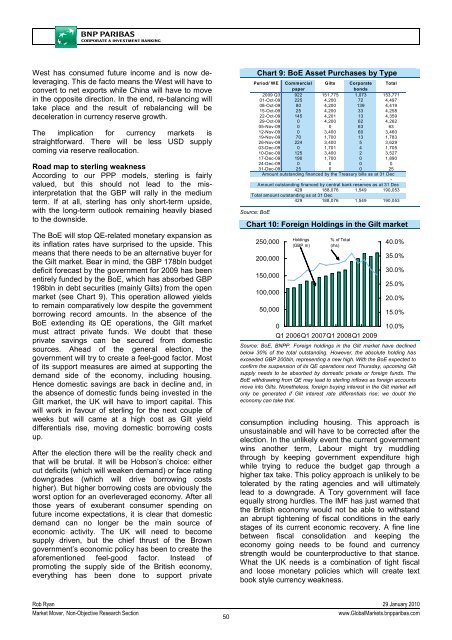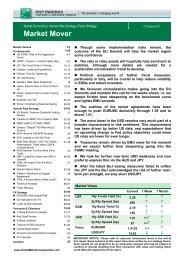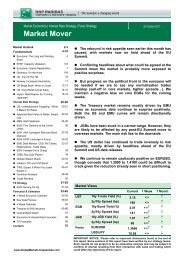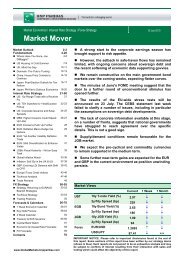Market Outlook - BNP PARIBAS - Investment Services India
Market Outlook - BNP PARIBAS - Investment Services India
Market Outlook - BNP PARIBAS - Investment Services India
Create successful ePaper yourself
Turn your PDF publications into a flip-book with our unique Google optimized e-Paper software.
West has consumed future income and is now deleveraging.<br />
This de facto means the West will have to<br />
convert to net exports while China will have to move<br />
in the opposite direction. In the end, re-balancing will<br />
take place and the result of rebalancing will be<br />
deceleration in currency reserve growth.<br />
The implication for currency markets is<br />
straightforward. There will be less USD supply<br />
coming via reserve reallocation.<br />
Road map to sterling weakness<br />
According to our PPP models, sterling is fairly<br />
valued, but this should not lead to the misinterpretation<br />
that the GBP will rally in the medium<br />
term. If at all, sterling has only short-term upside,<br />
with the long-term outlook remaining heavily biased<br />
to the downside.<br />
The BoE will stop QE-related monetary expansion as<br />
its inflation rates have surprised to the upside. This<br />
means that there needs to be an alternative buyer for<br />
the Gilt market. Bear in mind, the GBP 178bln budget<br />
deficit forecast by the government for 2009 has been<br />
entirely funded by the BoE, which has absorbed GBP<br />
198bln in debt securities (mainly Gilts) from the open<br />
market (see Chart 9). This operation allowed yields<br />
to remain comparatively low despite the government<br />
borrowing record amounts. In the absence of the<br />
BoE extending its QE operations, the Gilt market<br />
must attract private funds. We doubt that these<br />
private savings can be secured from domestic<br />
sources. Ahead of the general election, the<br />
government will try to create a feel-good factor. Most<br />
of its support measures are aimed at supporting the<br />
demand side of the economy, including housing.<br />
Hence domestic savings are back in decline and, in<br />
the absence of domestic funds being invested in the<br />
Gilt market, the UK will have to import capital. This<br />
will work in favour of sterling for the next couple of<br />
weeks but will came at a high cost as Gilt yield<br />
differentials rise, moving domestic borrowing costs<br />
up.<br />
After the election there will be the reality check and<br />
that will be brutal. It will be Hobson’s choice: either<br />
cut deficits (which will weaken demand) or face rating<br />
downgrades (which will drive borrowing costs<br />
higher). But higher borrowing costs are obviously the<br />
worst option for an overleveraged economy. After all<br />
those years of exuberant consumer spending on<br />
future income expectations, it is clear that domestic<br />
demand can no longer be the main source of<br />
economic activity. The UK will need to become<br />
supply driven, but the chief thrust of the Brown<br />
government’s economic policy has been to create the<br />
aforementioned feel-good factor. Instead of<br />
promoting the supply side of the British economy,<br />
everything has been done to support private<br />
Chart 9: BoE Asset Purchases by Type<br />
Period/ WE Commercial Gilts Corporate Total<br />
paper<br />
bonds<br />
2009 Q3 922 151,775 1,073 153,771<br />
01-Oct-09 225 4,200 72 4,497<br />
08-Oct-09 80 4,200 139 4,419<br />
15-Oct-09 25 4,200 33 4,258<br />
22-Oct-09 145 4,201 13 4,359<br />
29-Oct-09 0 4,200 62 4,262<br />
05-Nov-09 0 0 63 63<br />
12-Nov-09 0 3,400 60 3,460<br />
19-Nov-09 70 1,700 13 1,783<br />
26-Nov-09 224 3,400 5 3,629<br />
03-Dec-09 0 1,701 4 1,705<br />
10-Dec-09 125 3,400 2 3,527<br />
17-Dec-09 190 1,700 0 1,890<br />
24-Dec-09 0 0 0 0<br />
31-Dec-09 25 0 0 25<br />
Amount outstanding financed by the Treasury bills as at 31 Dec<br />
- - - -<br />
Amount outstanding financed by central bank reserves as at 31 Dec<br />
429 188,076 1,549 190,053<br />
Total amount outstanding as at 31 Dec<br />
429 188,076 1,549 190,053<br />
Source: BoE<br />
Chart 10: Foreign Holdings in the Gilt market<br />
250,000<br />
200,000<br />
150,000<br />
100,000<br />
50,000<br />
0<br />
Holdings<br />
(GBP m)<br />
% of Total<br />
(rhs)<br />
40.0%<br />
35.0%<br />
30.0%<br />
25.0%<br />
20.0%<br />
15.0%<br />
10.0%<br />
Q1 2006Q1 2007Q1 2008Q1 2009<br />
Source: BoE, <strong>BNP</strong>P. Foreign holdings in the Gilt market have declined<br />
below 30% of the total outstanding. However, the absolute holding has<br />
exceeded GBP 200bln, representing a new high. With the BoE expected to<br />
confirm the suspension of its QE operations next Thursday, upcoming Gilt<br />
supply needs to be absorbed by domestic private or foreign funds. The<br />
BoE withdrawing from QE may lead to sterling inflows as foreign accounts<br />
move into Gilts. Nonetheless, foreign buying interest in the Gilt market will<br />
only be generated if Gilt interest rate differentials rise; we doubt the<br />
economy can take that.<br />
consumption including housing. This approach is<br />
unsustainable and will have to be corrected after the<br />
election. In the unlikely event the current government<br />
wins another term, Labour might try muddling<br />
through by keeping government expenditure high<br />
while trying to reduce the budget gap through a<br />
higher tax take. This policy approach is unlikely to be<br />
tolerated by the rating agencies and will ultimately<br />
lead to a downgrade. A Tory government will face<br />
equally strong hurdles. The IMF has just warned that<br />
the British economy would not be able to withstand<br />
an abrupt tightening of fiscal conditions in the early<br />
stages of its current economic recovery. A fine line<br />
between fiscal consolidation and keeping the<br />
economy going needs to be found and currency<br />
strength would be counterproductive to that stance.<br />
What the UK needs is a combination of tight fiscal<br />
and loose monetary policies which will create text<br />
book style currency weakness.<br />
Rob Ryan 29 January 2010<br />
<strong>Market</strong> Mover, Non-Objective Research Section<br />
50<br />
www.Global<strong>Market</strong>s.bnpparibas.com
















